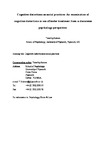Cognitive distortions as social practices: An examination of cognitive distortions in sex offender treatment froma discursive psychology perpective
| dc.contributor.author | Auburn, Timothy | |
| dc.date.accessioned | 2014-03-31T16:38:32Z | |
| dc.date.accessioned | 2014-03-31T16:44:10Z | |
| dc.date.available | 2014-03-31T16:38:32Z | |
| dc.date.available | 2014-03-31T16:44:10Z | |
| dc.date.issued | 2010 | |
| dc.identifier.issn | 1477-2744 | |
| dc.identifier.issn | 1477-2744 | |
| dc.identifier.uri | http://hdl.handle.net/10026.1/2928 | |
| dc.description.abstract |
This article presents a critique of the concept of cognitive distortion as it has been developed within the domain of sex-offender treatment programme theory and practice. Drawing upon a discursive psychology perspective, it is argued that cognitive distortions should not be considered as mental entities but as social practices. This argument is illustrated by closely examining how offenders’ accounts of their offences during sex offender treatment sessions were organised. Recordings and transcriptions of treatment group sessions were analysed for the occurrence of regular patterns of talk and interaction. This analysis focused on how minimisation was achieved through well documented rhetorical and conversational devices (conversational repair, narrative contrast devices). An orientation to cognitive distortions as a resource was also illustrated through examining its use by group members to admonish a focus offender and through a narrative reflexivity device. These findings suggest that the notion of cognitive distortion and its role in treatment settings should be reconsidered. Furthermore, it is suggested that a discursive psychology perspective can also make a highly relevant contribution to the evaluation of treatment group processes and that further research is needed in order to examine in detail the way that treatment groups are socially organised. | |
| dc.format.extent | 103-123 | |
| dc.language | English | |
| dc.language.iso | English | |
| dc.publisher | Taylor & Francis | |
| dc.relation.replaces | http://hdl.handle.net/10026.1/2927 | |
| dc.relation.replaces | 10026.1/2927 | |
| dc.subject | sex offender treatment | |
| dc.subject | cognitive distortions | |
| dc.subject | discursive psychology | |
| dc.subject | conversation analysis | |
| dc.subject | evaluation | |
| dc.title | Cognitive distortions as social practices: An examination of cognitive distortions in sex offender treatment froma discursive psychology perpective | |
| dc.type | journal-article | |
| dc.type | Article | |
| plymouth.author-url | https://www.webofscience.com/api/gateway?GWVersion=2&SrcApp=PARTNER_APP&SrcAuth=LinksAMR&KeyUT=WOS:000274796100007&DestLinkType=FullRecord&DestApp=ALL_WOS&UsrCustomerID=11bb513d99f797142bcfeffcc58ea008 | |
| plymouth.issue | 1-2 | |
| plymouth.volume | 16 | |
| plymouth.publisher-url | http://www.informaworld.com/ | |
| plymouth.publication-status | Published | |
| plymouth.journal | Psychology, Crime & Law | |
| dc.identifier.doi | 10.1080/10683160802621990 | |
| plymouth.organisational-group | /Plymouth | |
| plymouth.organisational-group | /Plymouth/Faculty of Health | |
| plymouth.organisational-group | /Plymouth/REF 2021 Researchers by UoA | |
| plymouth.organisational-group | /Plymouth/REF 2021 Researchers by UoA/UoA04 Psychology, Psychiatry and Neuroscience | |
| plymouth.organisational-group | /Plymouth/REF 2021 Researchers by UoA/UoA04 Psychology, Psychiatry and Neuroscience/UoA04 Psychology, Psychiatry and Neuroscience MANUAL | |
| plymouth.organisational-group | /Plymouth/Research Groups | |
| plymouth.organisational-group | /Plymouth/Research Groups/Centre for Brain, Cognition and Behaviour (CBCB) | |
| plymouth.organisational-group | /Plymouth/Research Groups/Centre for Brain, Cognition and Behaviour (CBCB)/Behaviour | |
| dc.publisher.place | UK | |
| dc.identifier.eissn | 1477-2744 | |
| dc.rights.embargoperiod | Not known | |
| rioxxterms.versionofrecord | 10.1080/10683160802621990 | |
| rioxxterms.licenseref.uri | http://www.rioxx.net/licenses/all-rights-reserved | |
| rioxxterms.type | Journal Article/Review |


